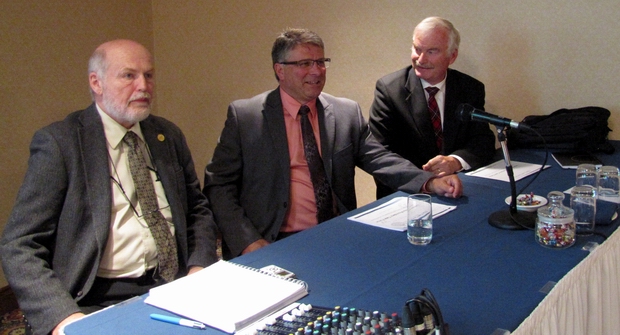Bringing Legal Services Under One Umbrella
Thursday, September 19, 2013 @ 3:58 AM

l-r Ron Usher, Bruce LaRose, and Ken Walker, members of the task force
Prince George, B.C. – By the end of this year, a special task force is hoping to present a report to the Provincial Government on bringing Notaries Public and Para Legals under the governance of the Law Society of British Columbia.
Notaries Public and Para Legals can carry out some of the same duties as their lawyer colleagues, but at much more affordable rates.
“There is no question our Notaries Act needs to be upgraded and modernized” says Ron Usher, General Counsel for Notaries Public, but whether those changes mean a single group would govern all three has yet to be determined.
In an era where self governance has come under fire, former President of the Law Society of B.C., Bruce LaRose, says the Law Society model is effective because it follows the mandate as established by the Legal Professions Act “That is to act in the best interests of the public” He says if the public was of the view the Law Society was not acting in the best interests of the public, “I would suspect the government would be hearing loud and clear about that.”
It’s the mix of those from the legal profession and the public at large that makes the Law Society model effective says LaRose “We have 6 members on the Board of Directors, we call Benchers, that are not lawyers, and they play an integral role in developing standards in the creation of regulation to ensure that the public is protected.” In addition to that, all of the hearing panels include lay people “So we’ve made great strides to include the public in our governance structures.”
So why look at bringing Notaries Public and Para Legals under the Law Society umbrella? It’s all about dollars and cents both for the public and for the organizations. The public can benefit from more affordable prices for such things as non complicated ( or contested) wills, real estate transfers and affidavits. The organizations can benefit from the economies of scale provided by being part of an organization which represents more than 10 thousand lawyers compared to their memberships which are about 5% of the Law Society’s numbers. According to LaRose, Notaries pay significantly more for their licensing and insurance than lawyers.
The task force was in Prince George yesterday, hearing from Notaries, Para Legals and the public about their thoughts on the merger with the Law Society. It was one of three such meetings scheduled to take place in B.C.
The task force is made up of members of the Notaries Public, the Para Legal Association, public and the legal profession. Even if the Task force recommends a single governance model, it could be years before there is any change. There would have to be changes to existing legislation, and that may not be a priority for the government of the day.
LaRose says the single governance model makes sense “This is a win, win for the public, the opportunity to increase access to legal services for the public at possibly more affordable costs, and more so than that, to offer more choice.”

Comments
Interesting. I think this is similar to having nurse practitioners in the medical field. I think it is a great idea. Any lawyer I know usually has way too much work on their plate so if they could offload it, it might make their practices more efficient.
Of course, those easier tasks e.g. wills and estates, corporate record books, can be the bread and butter of a law firm by bringing in money on a more regular basis. Interesting to see what practicing lawyers think of this.
I would think that lawyers who practice wills, estates, property transactions and corporate record keeping would be dead set against allowing notaries more clout under the auspices of law society governance.
metalman.
Sets up for a huge conflict of interest. Lawyers use para legals all the time. In a he said she said scenario who is to say how the law society will regulate.
The Law Society being akin to a union regulator and the lawyers always protecting their own interests, is this about shifting liability, justifying lowest common denominator regulations, or will the various classes of legal service providers be held to different standards?
Probably better to have firewalls between the organizations so as to have clarity in the legal responsibility for the very distinct professions.
What is that great Shakespeare quote ??
Comments for this article are closed.